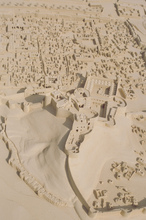| dc.coverage.spatial | Site: Bam (Iran) | en_US |
| dc.coverage.temporal | creation date: 200-1799, destruction date: by earthquake, 2003 | en_US |
| dc.creator | Unknown | en_US |
| dc.date | 200-1799 | en_US |
| dc.date.accessioned | 2011-08-02T19:04:10Z | |
| dc.date.available | 2011-08-02T19:04:10Z | |
| dc.date.issued | 200-1799 | en_US |
| dc.identifier | 161764 | en_US |
| dc.identifier.uri | http://hdl.handle.net/1721.3/67122 | en_US |
| dc.description | "The Arg-e Bam (Citadel of Bam), established in the Sassanian period, is situated atop an artificial hill in the northwest quadrant of the old city of Bam. This artificial hill, originally created from debris, elevates the citadel approximately 5 meters above the surrounding urban fabric. The citadel complex occupies an area 315 meters wide along the east-west axis by 270 meters long along the north-south axis. Bounded on the north by the river, by steep cliffs to the east, and by gardens and residential neighborhoods to the north, northwest and south, the Arg-e Bam was optimized for both self-sufficiency and protection
[...]
Natural disaster has recently struck Bam: shortly after the devastating earthquake of 26 December 2003, which leveled the city, the Arg-e Bam was inscribed on the 2004 World Heritage List, and added directly to the World Heritage in Danger List. Prior to the earthquake, the fortress had possessed the distinction of being the largest adobe building in the world, recognized for its unbaked mud brick (khesht) and poured mud wall (chineh) construction."
Source: http://archnet.org/library/sites/one-site.jsp?site_id=7861 [Accessed August 7, 2012] | en_US |
| dc.description | model (representation), 1999 | en_US |
| dc.format.medium | brick | en_US |
| dc.format.medium | mud | en_US |
| dc.format.medium | stone | en_US |
| dc.format.medium | straw (plant material) | en_US |
| dc.relation.ispartof | 122311 | en_US |
| dc.rights | (c) MIT Libraries, Aga Khan Visual Archive,photograph by Khosrow Bozorgi | en_US |
| dc.subject | Fortifications | en_US |
| dc.subject | Mosques | en_US |
| dc.subject | City walls | en_US |
| dc.subject | Citadels | en_US |
| dc.subject | Earthquakes | en_US |
| dc.subject | Bazaars (Markets) | en_US |
| dc.subject | Ruined cities | en_US |
| dc.subject | Bam (Iran) | en_US |
| dc.subject | Islamic cities and towns | en_US |
| dc.subject | Architecture --Iran | en_US |
| dc.subject | Lost architecture | en_US |
| dc.subject | World Heritage areas | en_US |
| dc.title | Citadel of Bam | en_US |
| dc.title.alternative | Arg of Bam (Citadel and Old City Walls) | en_US |
| dc.title.alternative | Arg-e Bam | en_US |
| dc.title.alternative | Arg e Bam | en_US |
| dc.title.alternative | Citadel and City Walls of Bam | en_US |
| dc.title.alternative | City of Bam, Citadel and Old Town | en_US |
| dc.type | Image | en_US |
| dc.rights.access | All rights reserved | en_US |
| dc.identifier.vendorcode | 3-10 | en_US |
| vra.culturalContext | Persian | en_US |
| vra.culturalContext | Islamic | en_US |
| vra.technique | construction | en_US |
| vra.worktype | Wall | en_US |
| vra.worktype | City | en_US |
| vra.worktype | Citadel | en_US |
| dc.contributor.display | Persian, Islamic | en_US |


